Summary of Findings
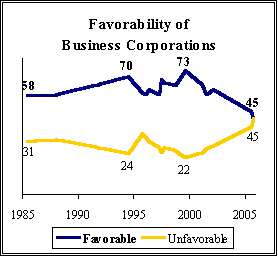
Americans express increasingly negative views of a wide range major institutions, reflecting strong discontent with national conditions. Over the past year, ratings have tumbled for the federal government and Congress. And it is not just Washington institutions that are being viewed less positively. Favorable opinions of business corporations are at their lowest point in two decades. In the face of high energy prices, just 20% express positive opinions of oil companies.
Favorable ratings for the federal government in Washington have taken the hardest hit, falling from 59% last year to 45% currently. The latest national survey by the Pew Research Center for the People & the Press, conducted among 2,006 Americans from Oct. 12-24, finds that even positive views of the military, while very high, have slipped slightly (from 87% in March to 82%). Just two institutions are unscathed by public discontent. Ratings for the Supreme Court and the news media were unchanged compared to previous surveys.

President Bush’s job approval rating is at 40%, just above its all-time low of 38% earlier this month, but favorable opinions of the president stand at their lowest point since he took office in 2001 (46%). Ratings for the Republican Party also have eroded in the past few months; more Americans now have a positive view of the Democratic Party than the Republican Party (49% vs. 42%).
What may be more striking, however, is the growing public discontent with business corporations. Just 45% say they have a favorable opinion of business corporations, while the same number express a negative view. Since the mid-1980s, solid majorities have consistently expressed positive views of corporations, but just 49% did so in July. The erosion in perceptions of corporations has come among most demographic and political groups. Oil companies, which have historically been far less popular than business corporations in general, also have lost ground with the public.
Allegations Affect GOP Leaders

The latest Pew survey finds that for the first time in his presidency, slightly more Americans say they have a generally unfavorable opinion of George W. Bush than a favorable opinion. The balance of opinion is even more negative when the intensity of peoples’ views is taken into account. Overall, just 18% say they have a “very favorable” opinion of the president, down from 27% in early October of last year. By comparison, 29% say they have a “very unfavorable” opinion of Bush, up from 20% a year ago.
Recent legal troubles have negatively affected public perceptions of a number of political leaders. As many Americans hold an unfavorable as a favorable view of Senate Majority Leader Bill Frist today. In January 2003, the public viewed him favorably by more than two-to-one.
Opinions of Rep. Tom DeLay are even more negative. Overall, 40% of Americans view DeLay unfavorably, while 18% view him favorably and 42% can’t rate him. In an April 2005 Gallup survey the public was more divided, with nearly as many rating Delay favorably as unfavorably.
Karl Rove, too, receives more unfavorable than favorable marks by roughly two-to one, though fully half are not familiar enough with the presidential adviser to rate him. The public is divided over Vice President Dick Cheney, with about as many rating him favorably as unfavorably. But this is not new; views of the vice president have been divided for more than a year.
The 2008 Hopefuls
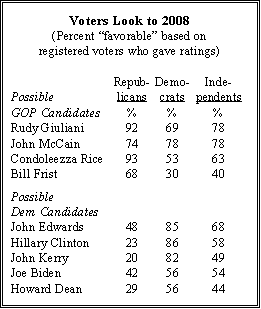
While public views of George W. Bush, Dick Cheney, and Tom DeLay are deeply partisan, a number of Republicans have maintained a generally favorable reputation across party lines. This is particularly true for Sen. John McCain, who is rated favorably by roughly three-quarters of the Republican, Democratic and independent voters familiar with him. Rudy Giuliani gains equally favorable marks from independents, and is viewed favorably by many more Republicans than is McCain. Secretary of State Condoleezza Rice also wins positive reviews from virtually all Republicans who offered a rating. Rice also earns favorable ratings from over half (53%) of Democratic voters familiar with her.
Among possible Democratic candidates, former Sen. John Edwards has the greatest crossover appeal he is viewed favorably by 85% of Democratic voters who can rate him, 68% of independents, and 48% of Republicans. Sen. Joe Biden is viewed favorably by 42% of Republicans who are familiar with him, but only 56% of Democrats. Fewer than half of registered voters knew Biden well enough to give a rating.
By comparison, Sens. Hillary Clinton and John Kerry remain highly polarizing figures. Democratic voters view Kerry favorably by roughly four-to-one, while Republicans view him unfavorably by the same margin and independents are divided (49% favorable, 51% unfavorable among those able to give a rating). Sen. Clinton receives similar ratings, though somewhat higher than Kerry among independents.
Business and the Media
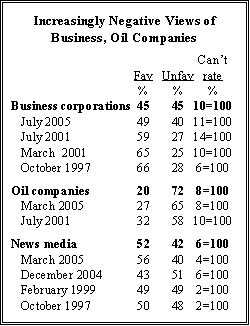
Public opinion about business corporations has taken a nosedive, and favorable ratings for corporations are 20 points lower than they were in March 2001. The decline is seen across most groups in the population, with favorable views falling about as much among conservatives as among liberals. Indeed, in the current poll, just half (50%) of conservatives say they have a favorable view of business corporations.
One specific industry asked about in the poll - oil companies - also has suffered a decline in its image, with just 20% now saying they have a favorable opinion of oil companies, down seven points since March. Fully 72% have an unfavorable view, with 34% holding very unfavorable views.

By contrast, slightly more people have a favorable than an unfavorable view of the news media (52% favorable, 42% unfavorable), about the same as in March of this year and up nine points from December 2004. Opinions about the news media have a partisan tilt, with 62% of Democrats viewing them favorably compared with just 44% of Republicans. Moderates (at 60% favorable) like the media more than do liberals (50%) or conservatives (44%).
Views of the Parties
For the first time since the heart of the controversy over the impeachment of President Bill Clinton, more people have an unfavorable than a favorable opinion of the Republican Party (49% unfavorable, 42% favorable, including 24% very unfavorable). These closely match the party’s image in January 1999 as the impeachment trial of Clinton got underway in the U.S. Senate. The party’s image rebounded during the presidential campaign that began that year and has remained mostly positive in the years since. Just after the election in December 2004, 52% were favorable toward the party and 42% were unfavorable.
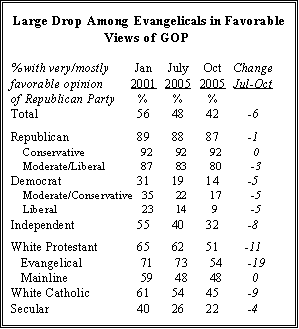
The most recent drop in favorable ratings of the GOP is seen mostly among independents and Democrats. But there has also been a significant decline among white evangelicals and Catholics as well.
By contrast, views of the Democratic Party are mostly unchanged; today 49% have a favorable opinion, while 41% are unfavorable, about the same as in July of this year and just slightly below the reading in December of 2004.
Other Institutions
Despite falling ratings for the federal government in general and Congress in particular, the military and the Supreme Court remain well regarded among a majority of the public. Roughly eight-in-ten (82%) have a favorable opinion of the military (with 44% very favorable), down slightly from March of this year but largely unchanged over the past eight years. About six-in-ten (62%) view the Supreme Court favorably, slightly better than in June of this year but down significantly over the past decade. Despite criticism by conservative and religious groups, the Supreme Court is better regarded among Republicans (72% favorable) than Democrats (59% favorable), and is rated as highly by white evangelical Protestants as by other religious groups.

Roughly half of the public now holds an unfavorable view of the federal government in Washington (48% unfavorable, 45% favorable), down sharply from February 2004 (59% favorable) and far below its high point this decade (73%, observed shortly after the invasion of Iraq in April 2003). Declining favorability toward the federal government is seen across the board politically, with double-digit drops among both Democrats and Republicans. The drop in regard for the government has been especially steep among African Americans, only 31% of whom now have a favorable view of the government (down from 55% favorable in February of last year).
Impressions of Congress are similar to those of the federal government: 45% are favorable, and the same number are unfavorable. Views about Congress are also sharply polarized by party affiliation.
Less Positive Views of DOD Than Military
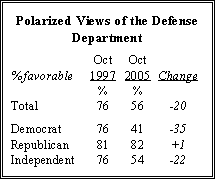
While the military continues to be well regarded by about eight-in-ten Americans, the same is not true for the Department of Defense. Favorable views of the Defense Department dropped 20 percentage points from 1997 to 2005, as views have become sharply polarized by party. Among Republicans, 82% view the department favorably, about the same as in 1997. But among Democrats, the percent favorable has dropped 35 points, from 76% to 41% today. Among independents, the drop has been 22 points (from 76% to 54% favorable).
News Interest Index
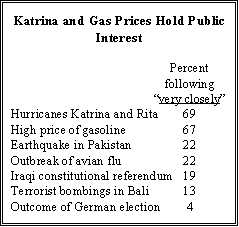
News about the impact of Hurricanes Katrina and Rita on the Gulf Coast, as well as the high price of gasoline these days, continue to capture high levels of public interest. Nearly seven-in-ten (69%) are following the aftermath of Hurricanes Katrina and Rita very closely; there has been no significant drop in public attention to this story since early September when 70% were following news of the storm very closely just after Katrina hit. (The current survey was conducted before Hurricane Wilma struck Mexico and south Florida).
Interest in gas prices also remains high, with 67% tracking the story very closely. This is not significantly different from earlier in October and early September when 65% and 71%, respectively, were following very closely.
About one-in-five Americans (19%) are following news about the constitutional referendum in Iraq. This contrasts with the 27% who followed the Iraqi elections last January very closely. Just 13% of the public is paying close attention to recent terrorist bombings in Indonesia. This is considerably lower than the 20% who followed the 2002 bombings in Bali nightclubs very closely and the 48% who followed the July 2005 attacks in London.
There is only modest attention to the recent earthquake in Pakistan; 22% are tracking this story very closely. This is considerably lower than the 58% of Americans who followed the earthquake and tsunami in the Indian Ocean last January but is roughly on par with attention to other earthquakes occurring outside the U.S.
Thus far, public attention to the outbreak of avian flu in Asia and Europe has been limited. About one-in-five (22%) say they are following this story. This is comparable to levels of attention to a 1998 outbreak of Asian flu spread by birds and chickens (19%).
As has been the case with attention to elections around the world, just 4% tracked the German presidential election with its initially unclear outcome. This is similar to the 6% who followed the French election upset of Jean-Marie LePen in 2002.